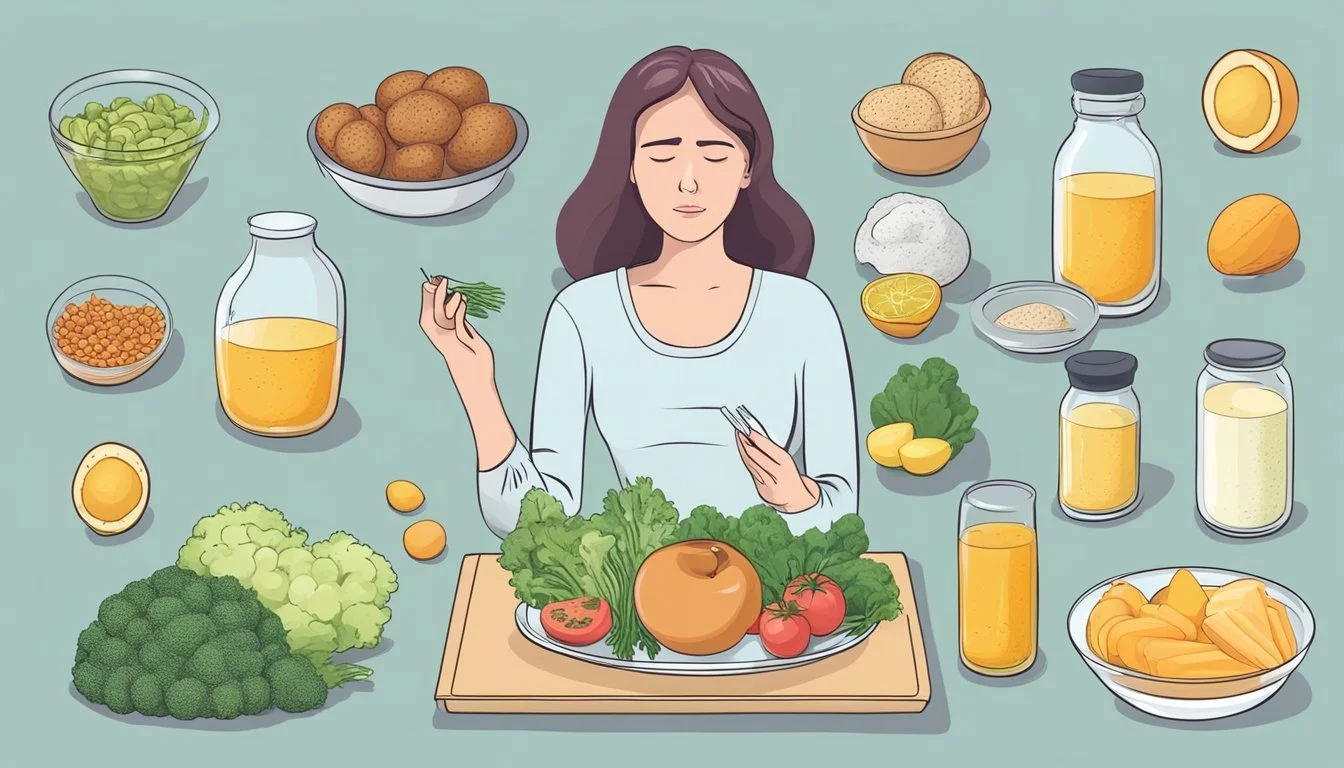Keto Diet and Yeast Infections
Understanding the Connection
The ketogenic, or keto, diet is a high-fat, low-carbohydrate eating regimen that has gained popularity for its potential to promote weight loss and improve certain health markers. By drastically reducing carbohydrate intake and replacing it with fats, the body is forced into a metabolic state known as ketosis, where it becomes efficient at burning fat for energy. A consequence of this dietary shift is the alteration of the body's microbiome, including that of the vaginal environment, which may sometimes lead to an increased risk of developing yeast infections.
Yeast infections are caused by the overgrowth of the fungus Candida, which is naturally present in the body in small amounts. The balance of microbes in the vagina is delicate, and changes in diet can disrupt this balance, potentially leading to symptoms like itching, discharge, and discomfort. Individuals on the keto diet may experience these symptoms due to significant reductions in their intake of carbohydrates, including fiber-rich plant-based foods that support a healthy vaginal flora.
While research on the direct association between the keto diet and increased risk of yeast infections is limited, it's important to acknowledge that any significant dietary change can impact the body's microbiology. It's also crucial for individuals to monitor how their bodies respond to dietary changes and seek guidance from healthcare professionals when adverse symptoms, such as those of a yeast infection, appear.
Understanding Yeast Infections
Yeast infections are a common occurrence caused by an overgrowth of the fungus Candida albicans. They can lead to a range of symptoms that are often uncomfortable but are usually treatable.
Causes of Yeast Overgrowth
Candida is a type of yeast that typically lives in small numbers on the skin and inside the vagina. It's part of the body's normal flora, but certain conditions can cause the yeast to multiply excessively, leading to a yeast infection. Factors that can contribute to yeast overgrowth include:
Antibiotic usage: which may decrease the population of bacteria that regulate yeast growth
Hormonal changes: such as those during pregnancy or caused by birth control
Impaired immune system: diseases or medications that weaken the immune system may allow yeast to proliferate
Diabetes: especially when blood sugar levels are not well controlled
Warm, moist environments: these conditions are conducive to yeast growth
Symptoms of Vaginal Yeast Infections
The symptoms of a vaginal yeast infection can range from mild to severe and include:
Itching and irritation in the vagina and at the entrance to the vagina (vulva)
A burning sensation, particularly during intercourse or while urinating
Swelling and redness of the vulva
Vaginal pain and soreness
Vaginal rash
Thick, white, odor-free vaginal discharge with a cottage cheese appearance
Diagnosis and Healthcare Provider's Role
A healthcare provider plays a crucial role in diagnosing a yeast infection. Diagnosis typically involves:
Reviewing the patient’s medical history and symptoms
Conducting a pelvic exam to inspect for signs of infection
Testing vaginal secretions, if necessary, to identify the type of fungus causing the infection
The provider may then recommend antifungal medications, either prescription or over-the-counter, depending on the severity of the symptoms and the patient's medical history. They can also provide guidance on preventing future infections and may discuss dietary changes if relevant.
Basics of the Keto Diet
The ketogenic diet, often referred to as "keto," is a low-carb, high-fat diet that aims to shift the body's metabolism away from carbohydrates and towards fat and ketone bodies.
Principles of Ketosis
Ketosis is a metabolic state in which the body uses fat for fuel instead of carbohydrates. When carbohydrate intake is significantly reduced, typically to around 20 to 50 grams per day, the body transitions into this state. The liver breaks down fats into molecules called ketones, which become the main energy source.
Typical Foods Consumed on Keto
A ketogenic diet consists predominantly of foods that are rich in healthy fats and low in carbohydrates.
Proteins: Lean meats, fish, eggs
Fats: Avocados, olive oil, nuts, seeds
Vegetables: Leafy greens, above-ground vegetables (broccoli, cauliflower)
Dairy: High-fat cheeses, butter, heavy cream
Note: Foods with high sugar content are avoided.
Potential Benefits of a Ketogenic Diet
The ketogenic diet is reported to have several health benefits, with research indicating potential in:
Blood sugar control: The diet may improve insulin sensitivity, which can prolong feeling full and stabilize blood sugar levels.
Weight management: A low-carb, high-fat diet can help the body burn fat more effectively, which may contribute to weight loss.
Neurological health: Ketones provide an alternative energy source for the brain which may have neuroprotective effects.
Keto Diet and Yeast Infections
In exploring the relationship between a ketogenic diet and yeast infections, it's essential to examine the impact of carbohydrate consumption on Candida growth, the potential benefits a keto diet might have on yeast overgrowth, and the risks or considerations that come with dietary changes.
Impact of Carbohydrates on Candida Growth
Candida, a type of fungus, can cause infections when it grows excessively in the body. A key factor in Candida overgrowth is the intake of carbohydrates. Sugars, which are simple carbohydrates, feed Candida, allowing it to multiply and spread.
Beneficial Aspects of Keto for Yeast Overgrowth
The ketogenic diet dramatically reduces carbohydrate intake and emphasizes healthy fats and lean proteins. This shift can lower blood sugar levels and may subsequently reduce Candida growth. Additionally, some individuals experiencing yeast overgrowth might find the keto diet's low-carb nature supportive as it minimizes the primary fuel source (sugar) for yeast.
Dietary Component Potential Impact on Yeast Overgrowth Low Carbohydrate Intake May reduce the food source for Candida, limiting its growth. Emphasis on Healthy Fats and Proteins Can support the gut microbiome health, strengthening the immune system.
Risks and Considerations
While the ketogenic diet may offer potential benefits for those concerned with yeast overgrowth, certain risks and considerations exist. Change in diet can influence the composition of the gut microbiome, sometimes resulting in adverse symptoms such as foul odors, known colloquially as "keto crotch". It's essential for individuals to monitor their body's response and to consider integrating probiotics to maintain a healthy balance of gut flora.
Nutritional Strategies Against Candida
Addressing a Candida overgrowth can be effectively supported through dietary choices. This section explores the role of specific antifungal foods and supplements, the importance of probiotics for gut health, and identifies foods that should be avoided to help prevent and control Candidiasis.
Antifungal Foods and Supplements
Certain natural foods are celebrated for their antifungal properties, making them useful allies in combating Candida. Garlic, for instance, is well-regarded for containing allicin, a potent antifungal agent. Similarly, coconut oil is rich in caprylic acid, which has been shown to target harmful yeast. Incorporating these into the diet can aid in suppressing fungal overgrowth. Additionally, olive oil contains oleuropein, another antifungal compound.
In terms of supplements, options like oregano oil, grapefruit seed extract, and caprylic acid supplements offer concentrated doses of antifungal agents. It's essential to consult a healthcare provider before starting any supplement regimen.
Probiotics and Gut Health
Probiotics are beneficial bacteria that support a healthy gut environment, which is crucial for keeping Candida in check. They can be found in fermented foods (What wine goes well with fermented foods?) such as yogurt, kefir, sauerkraut, and kimchi, or as dietary supplements. These probiotics help restore the natural balance of the microbiota, thereby improving the body's defense against yeast overgrowth.
Introducing probiotics into one's diet can also enhance the immune response and aid in the digestion and absorption of nutrients, all of which can be beneficial in managing Candida.
Foods to Avoid to Prevent Candidiasis
Certain foods can exacerbate Candida overgrowth and should be limited or avoided:
Foods to Avoid Reason to Avoid Sugars and sweeteners They can feed Candida, aiding its growth. Processed foods Often contain sugars and unhealthy fats. Refined carbohydrates Simple carbs can be quickly utilized by Candida. High-lactose dairy Lactose can serve as a sugar source for Candida. Alcoholic beverages Some types can increase Candida growth indirectly.
Limiting intake of these foods can help reduce the likelihood of a Candida overgrowth, as Candida thrives in environments with readily available sugars and simple carbohydrates.
Adjusting the Keto Diet for Women
When women adopt a ketogenic diet, they may need to make specific adjustments to account for hormones and body pH, which can both be influenced by dietary changes. These considerations are important for maintaining overall health and can help mitigate side effects like bloating and constipation.
Special Considerations for Females
Women should be aware that a high-fat, low-carbohydrate diet may lead to shifts in the microbial environment, which can influence vaginal pH and potentially lead to yeast infections. A diet that is high in fats and low in fibrous vegetables could lead to constipation, which can exacerbate bloating and discomfort. Dietary adjustments might need to include:
Increased Fiber Intake: Incorporating low-carb, high-fiber foods can help alleviate constipation. Options include leafy greens, broccoli, and chia seeds.
Adequate Hydration: Drinking sufficient water is crucial to help maintain digestive health and to support the flushing out of toxins.
The Role of Hormones and Body pH
Diet influences hormone levels, where a drastic reduction in carbohydrates can alter estrogen levels. This hormonal fluctuation might affect menstrual regularity and have a broader impact on women's health:
Estrogen Fluctuations: Lower carb intake can result in lowered estrogen levels, potentially affecting menstrual cycles.
Body pH: The body's pH can be altered by dietary changes, such as increased intake of fatty acids, which could lead to an imbalance in the vaginal microbiome.
A balanced ketogenic diet that takes into account the need for certain micronutrients and macronutrients can help women avoid these potential issues. Regular monitoring by health professionals is advised particularly when adopting a diet that significantly alters usual eating patterns.
Associated Conditions
In the context of the ketogenic diet, certain health conditions can influence the presence and severity of yeast infections, notably candida overgrowths. Understanding the dynamics of diabetes and the use of antibiotics is critical for individuals managing these infections while adhering to a low-carbohydrate lifestyle.
Diabetes and Its Impact on Candida
Diabetes, particularly when uncontrolled, creates an environment conducive to candida overgrowth. Elevated blood sugar levels can feed yeast cells, allowing them to thrive. Individuals with diabetes must therefore diligently manage their blood glucose to mitigate this risk.
Antibiotics and their Effect on Yeast Infections
Antibiotics can disrupt the balance of bacteria in the body, sometimes reducing the number of good bacteria that keep yeast like candida in check. When this balance is upset, it can lead to an increased risk of yeast infections. A mindful approach to antibiotic use is essential for those on a ketogenic diet to avoid such complications.
Lifestyle Factors Influencing Yeast Growth
Lifestyle factors play a pivotal role in the regulation of yeast growth within the body. Understanding how daily habits and choices impact yeast levels can be essential for maintaining balance and preventing overgrowth.
Impact of Stress and Immune Health
Stress has a direct correlation with immune function, which in turn influences yeast growth. When an individual experiences high levels of stress, the body releases cortisol, a hormone which can suppress the immune system. A weakened immune system may not be as effective at controlling candida populations, potentially allowing yeast to proliferate. Chronic stress may lead to immune depletion, exacerbating the risk of developing yeast infections.
The Effect of Alcohol and Caffeine Consumption
Alcohol:
Weakens immune defenses, potentially increasing susceptibility to yeast infections.
High sugar content in certain alcoholic beverages can provide an optimal feeding ground for yeast.
Caffeine:
Can exacerbate stress responses, potentially affecting mood swings and immune health.
Excessive intake may disturb the balance of the gastrointestinal flora, possibly promoting yeast overgrowth.
Monitoring and moderating alcohol and caffeine consumption can be beneficial for individuals looking to control candida levels and support their overall immune health.
Implementing a Targeted Keto Anti-Candida Plan
To address candida overgrowth through diet, an anti-candida ketogenic plan focuses on reducing carbohydrate intake to starve yeast while providing ample nutrition. This tailored approach helps manage symptoms like fatigue and brain fog by promoting gut health and stable blood sugar levels.
Designing an Anti-Candida Keto Menu
When crafting an Anti-Candida Keto Menu, it is crucial to eliminate high-carb foods that feed yeast, such as sugar and gluten, while incorporating high-fat, low-carb foods conducive to a ketogenic state.
Foods to Include:
Proteins: Grass-fed meat, wild-caught fish
Fats: Coconut oil, olive oil, avocado
Low-carb Vegetables: Leafy greens, cucumbers, zucchini
Fermented Foods: Sauerkraut, kefir (dairy-free options if necessary)
Foods to Exclude:
Sugary Foods: Cakes, pastries
Gluten-containing Grains: Wheat, barley
High Lactose Dairy Products: Milk, soft cheeses
It is advised to track macronutrients ensuring to maintain proper ketogenic ratios which often translate to 70-75% fat, 20-25% protein, and 5-10% carbohydrates.
Understanding Die-Off Symptoms and Keto Flu
Transitioning to a keto diet may result in Keto Flu, a temporary state where symptoms may include fatigue, brain fog, and digestion issues due to the body's adaptation to fat as a primary fuel source. Similarly, when Candida yeast die off rapidly due to dietary changes, they release toxins that can cause discomfort known as Die-Off Symptoms.
Key Identifiers:
Keto Flu: Occurs usually within the first week of starting the diet, can last a few days to two weeks.
Die-Off Symptoms: Might include headaches, bloatedness, and skin rashes.
These effects are generally short-lived. It is recommended to stay hydrated and consider supplementing with electrolytes to help alleviate these symptoms. Consulting with a healthcare professional before and during the diet change can provide personalized guidance to manage these effects appropriately.
Conclusion
Researchers and healthcare providers have investigated the ketogenic diet as a potential method to manage yeast infections. They consider its impact on the body's probiotic composition and how it might influence the symptoms such as itching, burning, and inflammation of the vulva.
Symptom Management: Individuals following a ketogenic diet may notice a reduction in the frequency of yeast infections. The emphasis on low-carb intake could potentially minimize the food source for Candida, the yeast responsible for such infections.
Possible Side Effects: Although some findings suggest benefits, individuals on a ketogenic diet may experience changes in vaginal pH, which can lead to increased bacterial growth and odors, a phenomenon sometimes referred to as "keto crotch."
Medical Guidance Recommended: Those experiencing chronic symptoms, such as chronic fatigue or recurring infections, should consult healthcare providers before making dietary changes. A provider may offer personalized advice, taking into account the patient's unique health profile.
In any consideration of diet and health, direct medical supervision is crucial. The ketogenic diet may offer a new avenue of hope for some, but only clear, evidence-based practice will define its role in managing vaginal yeast infections. It remains imperative for individuals to seek guidance from healthcare professionals when interpreting these findings and applying them to their own health journey.





